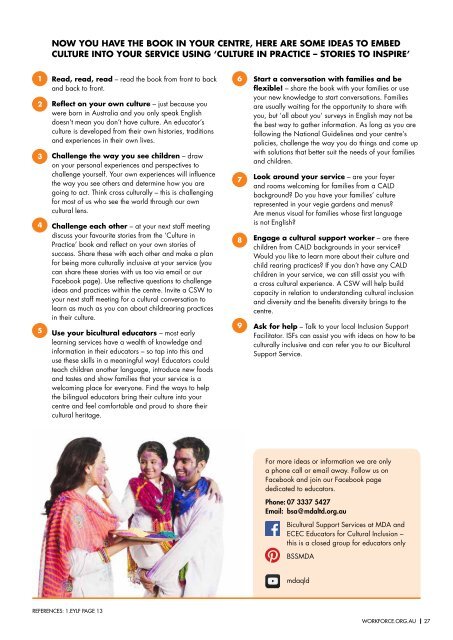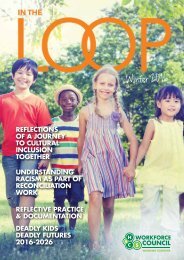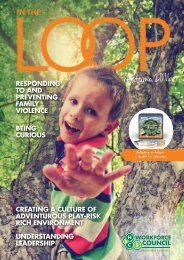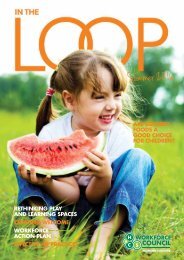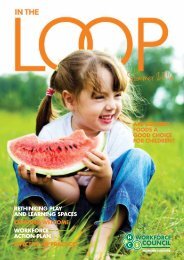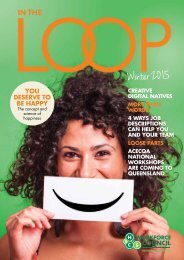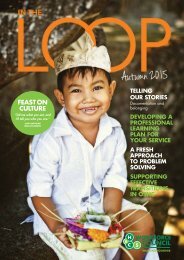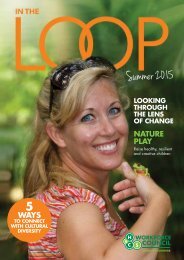The Loop Spring 2015 web.pdf
- No tags were found...
You also want an ePaper? Increase the reach of your titles
YUMPU automatically turns print PDFs into web optimized ePapers that Google loves.
NOW YOU HAVE THE BOOK IN YOUR CENTRE, HERE ARE SOME IDEAS TO EMBED<br />
CULTURE INTO YOUR SERVICE USING ‘CULTURE IN PRACTICE – STORIES TO INSPIRE’<br />
1 Read, read, read – read the book from front to back 6<br />
and back to front.<br />
2<br />
3<br />
4<br />
5<br />
Reflect on your own culture – just because you<br />
were born in Australia and you only speak English<br />
doesn’t mean you don’t have culture. An educator’s<br />
culture is developed from their own histories, traditions<br />
and experiences in their own lives.<br />
Challenge the way you see children – draw<br />
on your personal experiences and perspectives to<br />
challenge yourself. Your own experiences will influence<br />
the way you see others and determine how you are<br />
going to act. Think cross culturally – this is challenging<br />
for most of us who see the world through our own<br />
cultural lens.<br />
Challenge each other – at your next staff meeting<br />
discuss your favourite stories from the ‘Culture in<br />
Practice’ book and reflect on your own stories of<br />
success. Share these with each other and make a plan<br />
for being more culturally inclusive at your service (you<br />
can share these stories with us too via email or our<br />
Facebook page). Use reflective questions to challenge<br />
ideas and practices within the centre. Invite a CSW to<br />
your next staff meeting for a cultural conversation to<br />
learn as much as you can about childrearing practices<br />
in their culture.<br />
Use your bicultural educators – most early<br />
learning services have a wealth of knowledge and<br />
information in their educators – so tap into this and<br />
use these skills in a meaningful way! Educators could<br />
teach children another language, introduce new foods<br />
and tastes and show families that your service is a<br />
welcoming place for everyone. Find the ways to help<br />
the bilingual educators bring their culture into your<br />
centre and feel comfortable and proud to share their<br />
cultural heritage.<br />
7<br />
8<br />
9<br />
Start a conversation with families and be<br />
flexible! – share the book with your families or use<br />
your new knowledge to start conversations. Families<br />
are usually waiting for the opportunity to share with<br />
you, but ‘all about you’ surveys in English may not be<br />
the best way to gather information. As long as you are<br />
following the National Guidelines and your centre’s<br />
policies, challenge the way you do things and come up<br />
with solutions that better suit the needs of your families<br />
and children.<br />
Look around your service – are your foyer<br />
and rooms welcoming for families from a CALD<br />
background? Do you have your families’ culture<br />
represented in your vegie gardens and menus?<br />
Are menus visual for families whose first language<br />
is not English?<br />
Engage a cultural support worker – are there<br />
children from CALD backgrounds in your service?<br />
Would you like to learn more about their culture and<br />
child rearing practices? If you don’t have any CALD<br />
children in your service, we can still assist you with<br />
a cross cultural experience. A CSW will help build<br />
capacity in relation to understanding cultural inclusion<br />
and diversity and the benefits diversity brings to the<br />
centre.<br />
Ask for help – Talk to your local Inclusion Support<br />
Facilitator. ISFs can assist you with ideas on how to be<br />
culturally inclusive and can refer you to our Bicultural<br />
Support Service.<br />
For more ideas or information we are only<br />
a phone call or email away. Follow us on<br />
Facebook and join our Facebook page<br />
dedicated to educators.<br />
Phone: 07 3337 5427<br />
Email: bsa@mdaltd.org.au<br />
Bicultural Support Services at MDA and<br />
ECEC Educators for Cultural Inclusion –<br />
this is a closed group for educators only<br />
BSSMDA<br />
mdaqld<br />
REFERENCES: 1.EYLF PAGE 13<br />
WORKFORCE.ORG.AU 27


